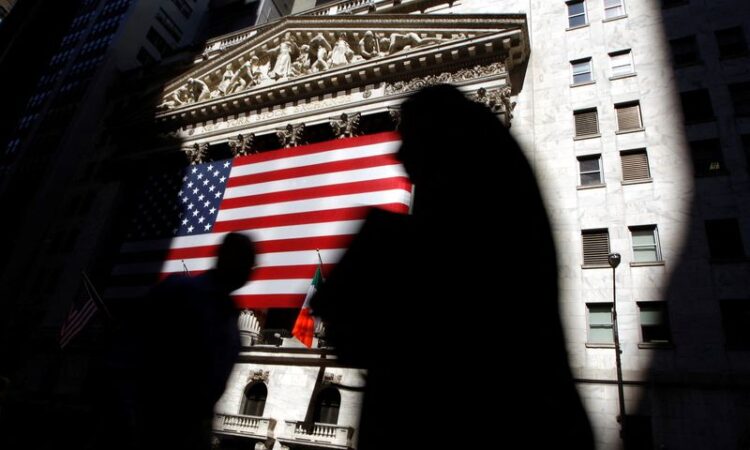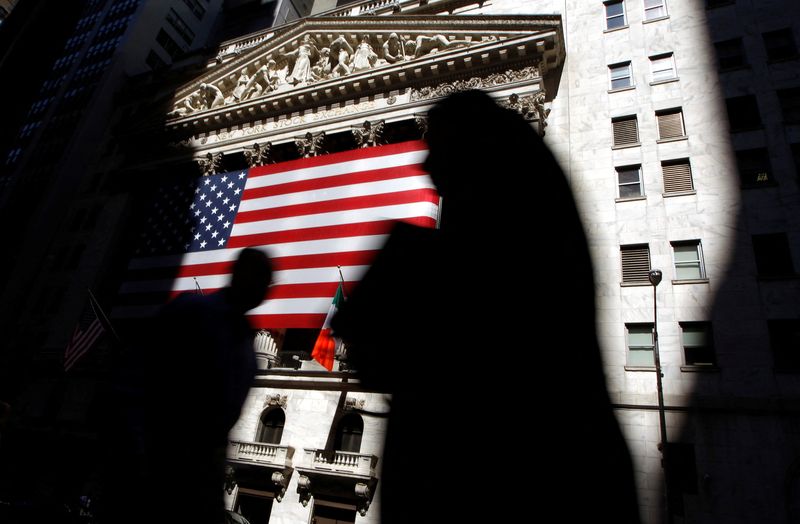

© Reuters
Investing.com — U.S. stock markets will be closed on Monday for a federal holiday following a muted session to end the prior week in the wake of a fresh slate of bank earnings. More Wall Street lenders are due to report results on Tuesday. Elsewhere, the World Economic Forum in Davos is set to begin, as a survey of top economists shows that the outlook for global growth this year is “subdued.”
1. Bank earnings ahead
Goldman Sachs (NYSE:) and Morgan Stanley (NYSE:) are due to report their latest quarterly results later this week after a mixed set of earnings from some of their biggest banking peers on Wall Street.
Investors will be keen to see how the two lenders, whose operations tend to focus more on investment banking and asset management, fared during a time of weaker mergers and acquisitions activity that has weighed on key advisory fees.
On Friday, a slew of large U.S. banks said that fourth-quarter trading profits were boosted by recent hopes that the Federal Reserve may soon lower interest rates down from more than two-decade highs. The optimism fueled a stock market rally late last year, while signs emerged that a dormant deal pipeline was starting to reawaken.
Months’ worth of elevated rates also supported net interest income, or the difference between what a bank pays for deposits and receives from loans, although some analysts wondered if this backstop was beginning to wane.
These institutions — which included JPMorgan (NYSE:), Bank of America (NYSE:), Wells Fargo (NYSE:) and Citigroup — set aside more provisions set aside to cover these souring loans, flagging an uptick in loan defaults back to pre-pandemic levels. Deep job cuts and steep one-off expenses dented returns as well.
But, even still, they presented a broadly upbeat assessment of the outlook for the U.S. economy, noting that consumer spending has remained resilient despite lingering pressures from higher borrowing costs.
2. U.S. markets to shutted for holiday
U.S. stock markets are set remain closed on Monday for the Martin Luther King Jr. holiday.
The major averages were muted to end the prior week, with the benchmark adding just 0.1% and the tech-heavy mostly unchanged. The laggard was the 30-stock , which dipped by 0.3%.
Along with the choppy bank earnings, investors were gauging data showing that headline U.S. producer prices unexpectedly dipped in December on a monthly basis due to a decline in costs for items like diesel fuel and food. The measure, which was also revised lower for November, has now fallen for three straight months.
Traders largely maintained bets that the Fed could slash rates from the current level of 5.25% to 5.50% as early as March, although several officials at the central bank have recently moved to temper these expectations. Many economists are now predicting that a cut in May or June is more probable.
“[T]he Fed probably needs to send a clearer message that the latest data does not justify the kind of aggressively dovish view embedded in money market pricing,” analysts at ING said in a note.
Policymakers will have fewer high-profile data points to parse through this week, though retail sales and University of Michigan inflation expectations may add more color to the U.S. inflation picture.
3. “Uncertainty” clouding new-term outlook – WEF survey
Uncertainty is clouding over the near-term outlook for the global economy, according to a survey conducted ahead of the World Economic Forum’s closely-monitored annual meeting.
Growth prospects in 2024 are “subdued,” the survey of the world’s top economists found, with 56% of respondents expecting conditions to weaken in the coming year. However, nearly a quarter foresee a stronger economy, while 20% predict that the environment will stay unchanged.
“The relative resilience of the world economy in the recent years will continue to be tested,” the survey said, adding that activity is “stalling” amidst indications of a slowdown in both the manufacturing and services sectors. Financial conditions, meanwhile, are expected to loosen as inflation eases and labor market tightness subsides.
The report comes as leaders in both government and business gather in the Swiss resort town of Davos to discuss issues ranging from economic trends and geopolitical concerns to the rise of generative artificial intelligence and environmental developments.
4. Baidu slips on report Ernie AI used by Chinese military
Hong Kong-listed shares of Baidu (HK:) slid as much as 12% on Monday after the South China Morning Post reported that the technology giant’s flagship Ernie artificial intelligence was used in testing by the People’s Liberation Army.
Baidu’s shares closed down 11.5% to HK$100.50, after falling as far as 12% earlier in the session.
The South China Morning Post (SCMP) reported that a research laboratory associated with the People’s Liberation Army (PLA) Strategic Support Force had tested an experimental AI system on Ernie, Baidu’s answer to OpenAI’s ChatGPT.
Baidu told the SCMP that the search engine company had no affiliation with the laboratory, and that any version of the Ernie bot used in the testing was likely a publicly available version. But the report ramped up concerns that any potential affiliation with the PLA could attract sanctions from the U.S., especially as both countries explore military applications of AI.
5. Crude choppy with Middle East in focus
Oil prices edged lower on Monday, paring back earlier gains, as fears remained that tensions in the Middle East could disrupt supplies through a key shipping route between Europe and Asia.
By 05:05 ET (10:05 GMT), the futures traded 0.8% lower at $72.25 a barrel, while the contract fell 0.6% to $77.81 a barrel.
The benchmarks jumped more than 2% last week to touch their highest intraday levels this year after the United States and Britain carried out the strikes on the Houthi forces in Yemen in retaliation for attacks by the Iran-backed group on shipping in the Red Sea (NYSE:).
The Houthi group threatened a “strong and effective response” on Sunday, potentially escalating the situation which has seen several shipping operators suspend routes through the Red Sea.






